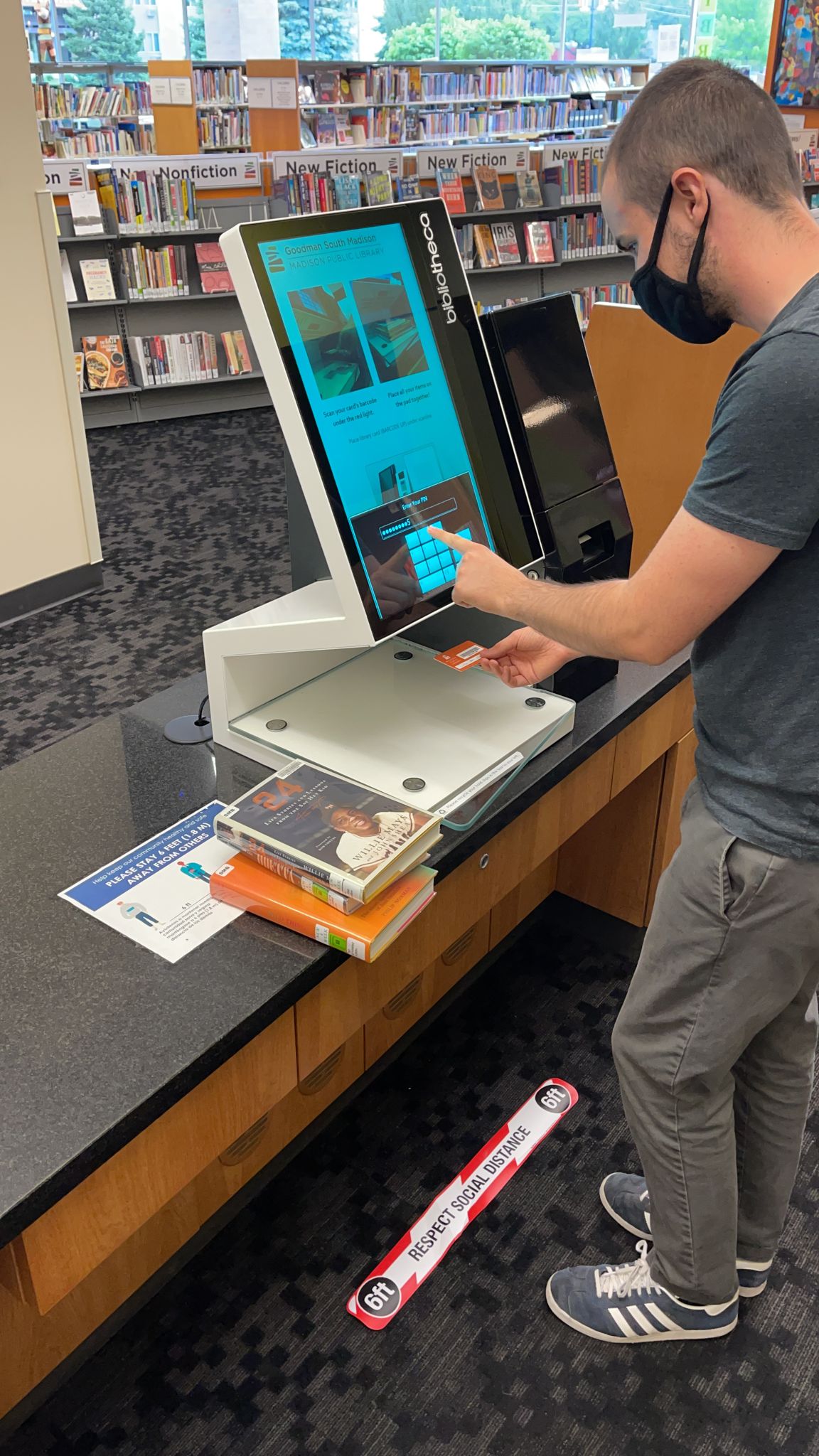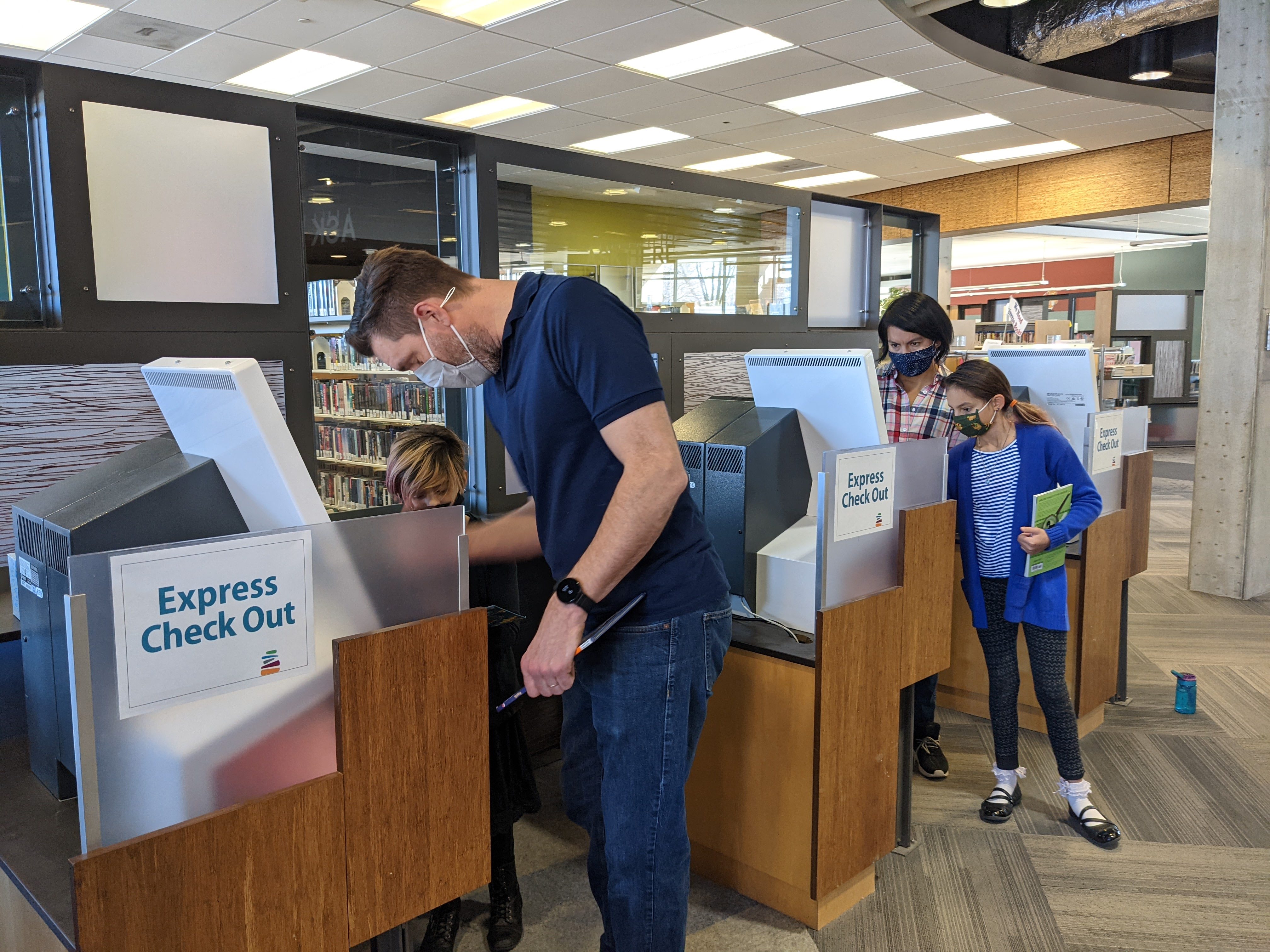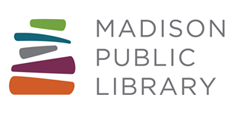
Self-check machines at Sequoya Library
The Early Days of Self-Check Machines
Madison Public Library's journey with self-check machines goes all the way back to the early 2000s when the first self-check machines were installed at Hawthorne, Pinney, Lakeview and Central Libraries. When the machines were originally installed, you needed to use a barcode reader to scan items one-by-one. A new technology called RFID (Radio Frequency Identification) would soon change that.
Over time, RFID has become the standard for self-check machines because it can scan items by proximity, as opposed to needing to read the barcode. This means that at each self-check machine at Madison Public Library locations, visitors can put one or multiple books on the self-check pads and they will be automatically scanned into the machine, saving time and increasing efficiency.
The first library to use the RFID style self-check machines was Goodman South Madison when they moved into their new building in 2010. A few other libraries have received the RFID self-check machines over the last decade, including Sequoya Library in 2012 and Meadowridge Library in 2014. However, a handful of our library locations either had older model self-checks with the barcode scanner or had no self-check machines at all.

A patron uses the self-check machines at Goodman South Madison Library
Tag! You're it!
"Goodman South Madison Library was the first Madison library to offer RFID self-checks and patrons really enjoy being able to quickly grab their own holds and be self-sufficient," said Brad Jeffries, a clerk at Goodman South Madison library.
Using the RFID technology isn't simply about the self-check machines themselves, however. Each individual library book or material must have an RFID tag added to them in order to interact with the machines. It has also become common practice at Madison Public Library for RFID tags to be added to new materials upon arrival, while they are being processed to be added to the collection and before they begin circulating. Library staff will also add RFID tags to any books that come through our library locations from the South Central Library System because more and more libraries are adding this technology and the cooperation between libraries benefits us all when making this change.
Adding RFID tags to library materials is a manual, one-book-at-a-time process. When a new self-check machine is set to be installed at a location, the job of retrofitting existing library materials is an all-hands-on-deck affair, with all levels of staff pitching in to help tag items. This work has been going on slowly since the first RFID machine was installed in 2010, but the timeline for adding tags to every book was moved up significantly when five library locations received self-check machines in 2020. In fact, one library assistant Hannah Majeska worked during the pandemic to add thousands of RFID tags to books at Lakeview Library.

Library Assistant Hannah Majeska poses with completed rolls of RFID tags at Lakeview Library
The Stars Align for Self-Checks
"It’s been a good experience. It’s a quiet little (well BIG) job," said Majeska. "The percentage of items in the library that I’ve handled has increased significantly – I’ve probably touched 80% of the collection at Lakeview.”
The tagging of materials happens prior to a machine being installed, so there was a LOT of this tagging work that happened last year. In 2020, we installed new self-check machines at 5 library locations -- Hawthorne, Lakeview, Alicia Ashman, Pinney and Central Libraries -- while buildings were closed during the pandemic. Many factors contributed to the perfect storm of being able to do so many installs at once, including the fact that self-check machines have improved over time while also becoming more affordable, that more and more libraries in the South Central Library System and across the country are using RFID technology, and that the onset of a global pandemic provided that extra impetus to provide a socially-distanced option for visitors. With library buildings empty, it made the installation of self-check machines run more smoothly, with less inconvenience to staff and visitors.
"People like being able to check out their own materials, not have to wait in line, and have more privacy with the items they’ve chosen to check out," said Circulation and Borrower Services Manager Margie Navarre-Saaf. "As we reopen our buildings the ability for visitors to social-distance and provide a safe and easy alternative to close interactions with library staff was important to us."

A family uses the self-check machines to check out at Sequoya Library
The installation of self-check machines has had another unexpected impact that allowed for more efficient use of staff, as well as a more convenient experience for library visitors - Open Holds. Prior to self-check machines being installed at each location, holds were kept behind the circulation desk; Patrons would have to come to the desk and be checked out by library staff. Once self-check machines were installed, we were able to move holds out into public spaces so people could stop by to grab their materials and check themselves out without having to stand in line. The move to go Fine Free in 2020 will also contribute to a smoother experience for visitors.
"With the elimination of fines, more people can use self-check machines without having to make a stop at the circulation desk first to pay fines," said Navarre-Saaf. "In the past, if your card was blocked due to fines, you were unable to use the self-check machines, so we're excited for there to be one less barrier as visitors return to the buildings."
Monroe Street Library is the final library to receive new self-check machines with the RFID technology, and those machines are being installed just a week after our reopening date of May 24. With that installation, all 9 library locations will have self-check machines available to patrons. Library staff will have tagged nearly a quarter of a million library materials with RFID tags to ensure things run smoothly for visitors.
“The only materials that don't get RFID tags are those with a short shelf life - like magazines - or those at a high risk for being chewed - like children's board books,” said Navaare-Saaf with a laugh.
The journey to providing self-check machines for our visitors at every library location has been two decades in the making, but our goal to continuously improve library services has stayed the same over the years. Using self-checks not only improves the experience of our customers but allows our staff to spend more time answering questions, recommending books, or connecting with people in the community.


